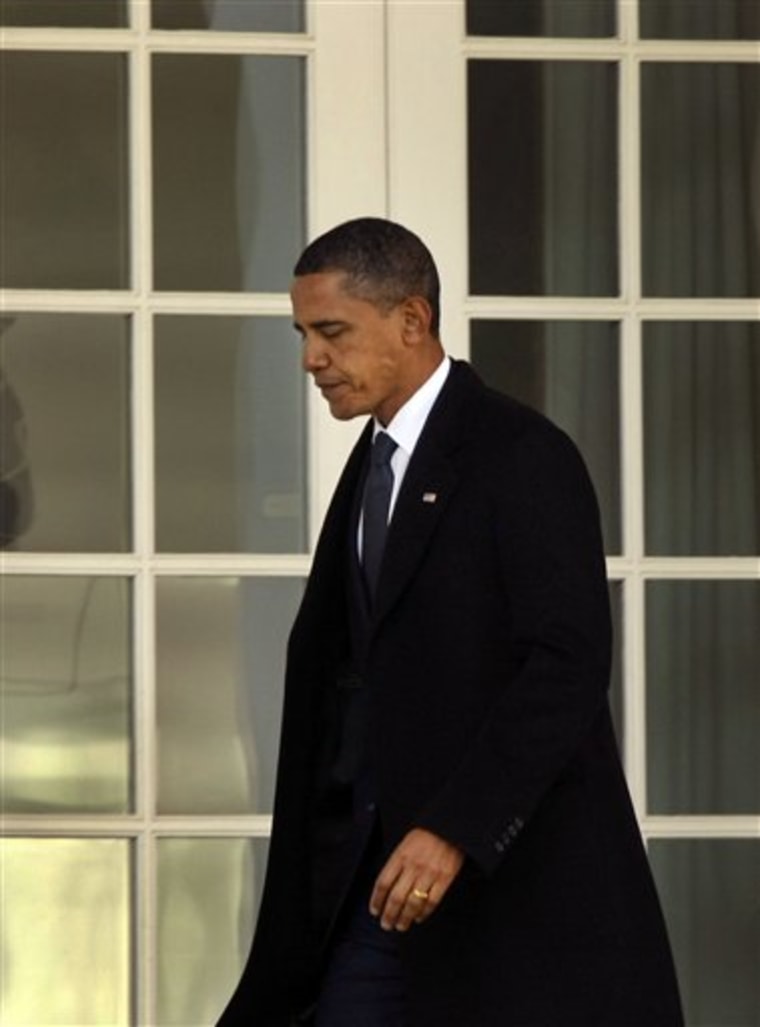President Barack Obama has indicated support for a national clearinghouse where consumers could shop for health coverage and an end to the decades-old antitrust exemption enjoyed by insurance companies, Democratic officials said Tuesday.
In signaling his preferences, Obama is siding with House Democrats over their Senate counterparts on issues crucial to negotiations on his health care overhaul.
House Democrats are pressing for both provisions to be included in the final measure, now that their proposal for a government-run insurance option appears dead due to opposition from key Senate moderates. Obama also has sided with the Senate to support a new tax on high-value insurance plans opposed in the House.
Obama met with House Democratic leaders last week as they sought support from the president on other priorities. Obama is now indicating support for creation of a national exchange rather than the state-based structure in the Senate bill, and for revoking the antitrust exemption, which the Senate bill does not do, the officials said.
The officials spoke on condition of anonymity because the negotiations were private.
The maneuvering comes as House Democrats returned Tuesday from their holiday break prepared to step up negotiations with the Senate to get a final health overhaul bill to Obama's desk in time for his State of the Union address sometime early next month.
The legislation passed by both chambers before Christmas is similar in many respects, including expanding the federal-state Medicaid insurance program for the poor and imposing a first-time requirement for almost everyone to purchase insurance. Both bills would extend health coverage to more than 30 million uninsured Americans over the next decade.
But there are important differences that are now the subject of intense closed-door negotiations among House and Senate Democratic leaders and White House officials.
One is the structure of a new insurance marketplace, called an exchange, where uninsured or self-employed Americans and small businesses would go to shop for insurance plans that would have to meet certain standards.
The House bill creates a national exchange regulated by the federal government, and House Democrats contend the national setup and larger pool would yield more competition for consumers and accountability for insurance companies. The Senate bill relies on state exchanges instead, an approach that appeals to moderates concerned about excessive federal government intrusion in the health care system.
The health insurance industry prefers the state-based Senate approach.
For House Democrats who strongly supported a new government insurance plan, the national exchange has now emerged as a top priority for the final bill. Supporters say the national approach is more likely to provide consumer protection and create uniformity than a series of state-based structures.
On the antitrust issue, the House bill would repeal portions of the McCarran-Ferguson Act of 1945, which gives states authority to regulate the insurance industry for antitrust matters, exempting the companies from federal jurisdiction. Several Senate Democrats wanted the repeal in the Senate bill, but Majority Leader Harry Reid, D-Nev., omitted it out of deference to moderate Sen. Ben Nelson, D-Neb., the Democrats' crucial 60th vote on the health bill. House Democrats are insistent it should be in the final bill.
On other issues:
- House Democrats are pushing for more generous subsidies to help low- and middle-income people buy coverage and Obama supports that. Under the Senate bill, the average subsidy that someone shopping in the exchange would get in 2019 is $5,600, while in the House bill it's $6,800.
- Negotiators are looking at how to tweak a tax on high-value insurance plans that's in the Senate bill, but strongly opposed by House Democrats and organized labor, who would prefer to raise income taxes on the highest-earning Americans. As passed by the Senate, the 40 percent tax would hit individual health plans worth $8,500 or more and family plans worth $23,000 or more. Union leaders fear their members would be unduly penalized by the tax, and there's been discussion of moving the thresholds higher.
Obama met with union leaders Monday, and one union official familiar with the discussions said labor leaders and White House staff also explored the possibility of exempting or delaying health plans covered by collective bargaining agreements from being subject to the tax. They also discussed possible carve-outs for state and government employees, many of whom are unionized.
But some union officials are concerned about any compromise that would appear to give unions special treatment. They want a fix that protects both union and nonunion middle-class workers from paying higher taxes on health plans.
Another union official said leaders who were frustrated going into the meeting walked away encouraged that there was room for movement to make a final plan more palatable for unions and easier for leaders to sell to their members.
The goal was for White House staffers to come up with a revised plan for the insurance plan excise tax within 48 hours of Monday's meeting. Union leaders, including AFL-CIO head Richard Trumka, met with House Speaker Nancy Pelosi, D-Calif., Tuesday afternoon. Union leaders planned a conference call later in the day to discuss strategy.
The union officials spoke on condition of anonymity because of the sensitivity of the negotiations.
